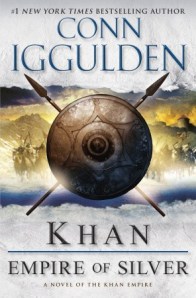
by fljustice | Jan 4, 2011 | Books, Fiction, Reviews
“Khan: Empire of Silver” by Conn Iggulden
From the Synopsis:
“Genghis Khan is dead, but his legend and his legacy live on. His son Ogedai has built a white city on a great plain and made a capital for the new nation. Now the armies have gathered to see which of Genghis’ sons has the strength to be khan. The Mongol empire has been at peace for two years, but whoever survives will face the formidable might of their great enemy, China’s Song dynasty.”
 Conn Iggulden (author of the Emperor series on the life of Julius Caesar) brings us the fourth in his Conqueror series covering the history of the Mongols. The book begins with a very unhorde-like activity…building a city. But quickly moves into palace intrigues as Genghis’ heir, the ailing Ogedai, moves to thwart his brother’s attempt to assassinate him and take over the assembled nation. From there, Iggulden takes us on a roaring ride—all battles, military strategy, and new weapons (including proto-cannons)—lots of blood, death, and unimaginable destruction. Not having lived in or studied this time period, I couldn’t say if it accurately reflects the thinking of the time, but it felt visceral and grounded in the known facts. Iggulden makes good use of everyday details from food, drink, clothes, geography and shamanism to build a world and give us access to it. (more…)
Conn Iggulden (author of the Emperor series on the life of Julius Caesar) brings us the fourth in his Conqueror series covering the history of the Mongols. The book begins with a very unhorde-like activity…building a city. But quickly moves into palace intrigues as Genghis’ heir, the ailing Ogedai, moves to thwart his brother’s attempt to assassinate him and take over the assembled nation. From there, Iggulden takes us on a roaring ride—all battles, military strategy, and new weapons (including proto-cannons)—lots of blood, death, and unimaginable destruction. Not having lived in or studied this time period, I couldn’t say if it accurately reflects the thinking of the time, but it felt visceral and grounded in the known facts. Iggulden makes good use of everyday details from food, drink, clothes, geography and shamanism to build a world and give us access to it. (more…)
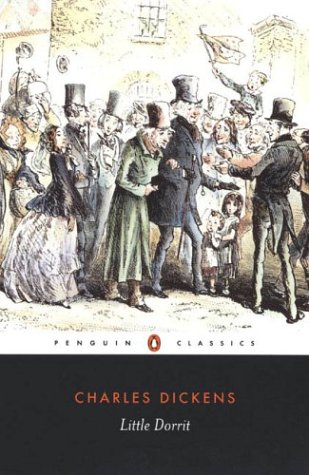
by fljustice | Nov 7, 2010 | Books, Fiction, Reviews
“Little Dorrit” by Charles Dickens
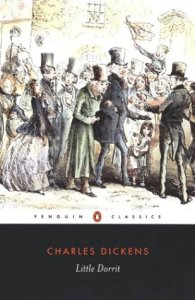 Every now and then, I turn back to the classics and remind myself why they are “classic.” Charles Dickens has always been a favorite of mine, but I had never read Little Dorrit. I picked up a Wordsworth edition (over 800 pages with introduction, preface and footnotes) which sat on my “To Be Read” shelf for several months before I plucked up the energy to tackle it. Once I started, I couldn’t put it down.
Every now and then, I turn back to the classics and remind myself why they are “classic.” Charles Dickens has always been a favorite of mine, but I had never read Little Dorrit. I picked up a Wordsworth edition (over 800 pages with introduction, preface and footnotes) which sat on my “To Be Read” shelf for several months before I plucked up the energy to tackle it. Once I started, I couldn’t put it down.
The story is simple: a few good souls struggle with fate’s decrees, society’s vagaries, fools and evil-doers to find “a modest life of usefulness and happiness.” Oh, but what innocent souls, twisted evil-doers and delicious fools! There’s a reason why “Dickensian” is applied to certain well-drawn characters. Dickens saw deep into the heart of humankind and had a wonderful facility for bringing people to life in lush eccentric detail. Amy Dorrit, as the titular character, is tiny in size, but huge in impact. She’s gentle, giving, industrious and the emotional bulwark of her family and friends. In spite of being born and raised in a debtor’s prison where her gentleman father was incarcerated for over twenty years, Little Dorrit is beloved by all who come to know her. Arthur Dennam is a man entering middle age and haunted by a secret he suspects and his mother won’t divulge. He’s an honorable man and wants no one hurt on his behalf. But he falls into the trap of denying his emotions and settling for less than he’s worth. (more…)
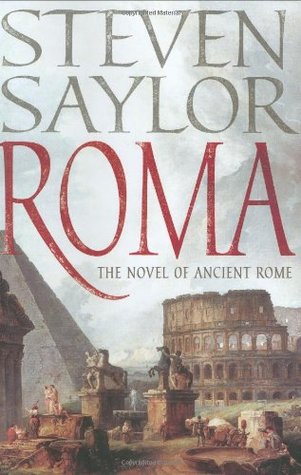
by Faith Justice | Sep 12, 2010 | Books, Fiction, Reviews
“Roma: The Novel of Ancient Rome” by Steven Saylor
Over three thousand years ago, a murder takes place on an island in a river flowing through the hilly region of Italy later known as the ruma. This bloody act presages the rise of one of the ancient world’s most ruthless empires. In Roma: The Novel of Ancient Rome, Steven Saylor takes us on a thousand-year journey from Rome’s mythical beginnings as a trading post for salt sellers through its evolution into an empire, in a style reminiscent of James Michener. Along the way we witness Hercules‘ destruction of the monster Cacus; the founding of the walled city of Rome by a couple of young bandits named Romulus and Remus; the abduction of the Sabine women; invasions by enemies; and revolutions by generals, plebeians and slaves. Throughout, Saylor provides us with real people and understandable motivations, whose stories have been transformed over time into the stuff of myth and legend. (more…)
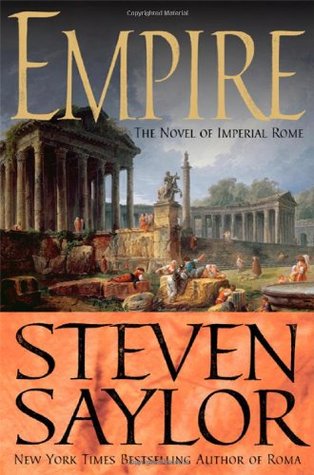
by Faith Justice | Aug 25, 2010 | Books, Fiction, Reviews
“Empire: The Novel of Imperial Rome” by Steven Saylor
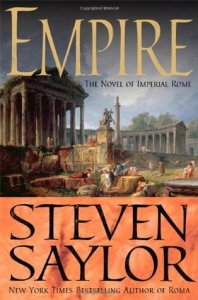 Empire:The Novel of Imperial Rome continues the story of the Pinarius family chronicled in Steven Saylor’s earlier novel Roma: The Novel of Ancient Rome. In the earlier book, we followed the aristocratic family from the founding of Rome through the Republican years. Empire picks up at the end of Augustus’ reign and concludes at the end of Hadrian’s, covering about 130 years and four generations of Pinarii. Saylor sets himself a Herculean task to cover the major events and people of the times in an entertaining and accessible way using a formula perfected by James A. Michener in his historical epics. He mostly succeeds. (more…)
Empire:The Novel of Imperial Rome continues the story of the Pinarius family chronicled in Steven Saylor’s earlier novel Roma: The Novel of Ancient Rome. In the earlier book, we followed the aristocratic family from the founding of Rome through the Republican years. Empire picks up at the end of Augustus’ reign and concludes at the end of Hadrian’s, covering about 130 years and four generations of Pinarii. Saylor sets himself a Herculean task to cover the major events and people of the times in an entertaining and accessible way using a formula perfected by James A. Michener in his historical epics. He mostly succeeds. (more…)
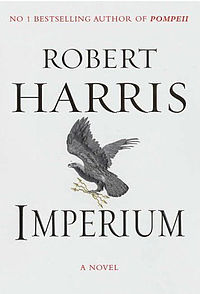
by Faith Justice | Aug 12, 2010 | Books, Fiction, Reviews
“Imperium: a Novel of Ancient Rome” by Robert Harris
 From the opening pages:
From the opening pages:
“Imperium—the power of life and death as vested by the state in an individual. Many hundreds of men have sought this power, but Cicero was unique in the history of the republic in that he pursued it with no resources to help him apart from his own talent. He was not, unlike Metellus or Hortensius, from one of the great aristocratic families, with generations of political favors to draw on at election time. He had no mighty army to back up his candidacy, as did Pompey or Caesar. He did not have Crassus‘ vast fortune to smooth his path. All he had was his voice—and by sheer effort of will he turned it into the most famous voice in the world.”
A Little History
Imperium is the first in a trilogy of novels about the life and times of Marcus Tullius Cicero, one of Republican Rome’s most famous orators and politicians. The book is narrated by Tiro, Cicero’s slave and secretary, many years after Cicero’s death. Tiro existed and is thought to have lived to be a hundred years old. He was famous for creating a short hand that he used for taking notes and later was adopted by the Senate. There is considerable evidence he wrote a biography of his former master, but those books are lost to history. Harris gives him back his voice. (more…)

 Conn Iggulden (author of the Emperor series on the life of Julius Caesar) brings us the fourth in his Conqueror series covering the history of the Mongols. The book begins with a very unhorde-like activity…building a city. But quickly moves into palace intrigues as Genghis’ heir, the ailing Ogedai, moves to thwart his brother’s attempt to assassinate him and take over the assembled nation. From there, Iggulden takes us on a roaring ride—all battles, military strategy, and new weapons (including proto-cannons)—lots of blood, death, and unimaginable destruction. Not having lived in or studied this time period, I couldn’t say if it accurately reflects the thinking of the time, but it felt visceral and grounded in the known facts. Iggulden makes good use of everyday details from food, drink, clothes, geography and shamanism to build a world and give us access to it. (more…)
Conn Iggulden (author of the Emperor series on the life of Julius Caesar) brings us the fourth in his Conqueror series covering the history of the Mongols. The book begins with a very unhorde-like activity…building a city. But quickly moves into palace intrigues as Genghis’ heir, the ailing Ogedai, moves to thwart his brother’s attempt to assassinate him and take over the assembled nation. From there, Iggulden takes us on a roaring ride—all battles, military strategy, and new weapons (including proto-cannons)—lots of blood, death, and unimaginable destruction. Not having lived in or studied this time period, I couldn’t say if it accurately reflects the thinking of the time, but it felt visceral and grounded in the known facts. Iggulden makes good use of everyday details from food, drink, clothes, geography and shamanism to build a world and give us access to it. (more…)




